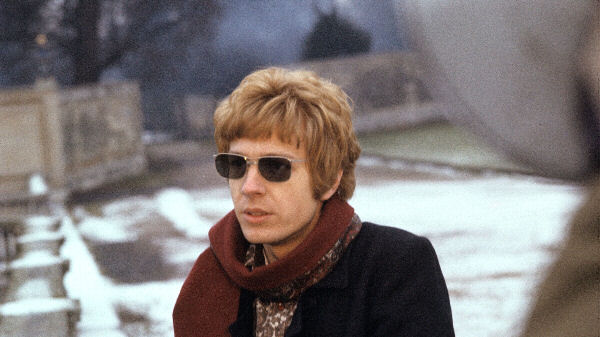 This Is Not A
BLOG!
This Is Not A
BLOG!
Date: 26/03/19
"A Cathedral Lit By A Sunset"

Scott Walker (Noel Scott Engel)
Musician, composer, producer
b. 9 January 1943, d. 22 March 2019
There have been few more enigmatic figures in popular music in the last fifty years than Scott Walker.
After starting his recording career in his early teens with a series of second-level (and frequently cutesie-pie) rock 'n' roll and rockabilly cuts for small labels in California, he turned to sessioneering as a bass-player before forming a duo with John Maus to create the Walker Brothers, with Gary Leeds joining on shortly afterwards.
It was shortly after their career started to take off in early 1965 that the 'brothers' decided to decamp to London to work with Philips Records' arranger Ivor Raymonde and producer Johnny Franz. Here was where things really took off, when the combination of Spectoresque production and lavish orchestral arrangements quite caught the record-buying public's imagination.
Having been primarily a backing voice on their early UK cuts, Scott was brought to the front for a remarkable run of hits, as his distinctive baritone voice (like mahogany inlaid with bronze, or as described by the English poet Ian McMillan in the title of this piece) and his demeanour of wounded melancholy gave an unstoppable force to one of the great 'breaking-up' songs of all time:

More hits followed, but what would now be called the 'superstardom' which resulted was something Scott Walker found difficult to deal with, and this - allied with his frustration with the material they were being required to release - led to the 'brothers' themselves breaking up in 1967.
It had been obvious from some of the songs that he had written for the trio that his musical ambitions were far wider and deeper than he had been given rein for in the group context (their B-sides - frequently self-written - were often far more intruiging and adventurous than the hits, a trait they shared at that time with the Troggs and Dave Dee, et al.). So it was that, when his first solo LP appeared in 1967, it contained cover versions of songs by Tim Hardin, André and Dory Previn and - most significantly - Jacques Brel, these last with English lyrics by Mort Shuman. The same formula (if anything done by Walker in his solo career could ever be described as 'formulaic') was continued on his second LP, which opens with the rip-roaring arrangement of Brel's Jackie which you can hear here. Here though is the B-side, The Plague, a self-penned track which illustrates clearly the direction he wanted to go, to the darker, more sinister side of humanity:

Three more albums followed (including Scott 4 which - with typical contrariness - he issued under his birth name, thus confusing everyone and resulting in the record failing to chart). This - consisting entirely of his own songs - is nonetheless now regarded as something of a classic. In amongst songs about Bergman's Seventh Seal and the crushing of Czechoslavakia, here's Get Behind Me (and I wish the BBC hadn't pulled the footage from 2017's Proms tribute concert, in which John Grant, Jarvis Cocker, Susanne Sundfør and Richard Hawley take the song to a new level):

The seventies were, on the whole, a difficult time for Scott Walker, with drink and drug issues contributing to his wayward path through that decade. This included making a series of deeply underwhelming sets of cover versions. The reformation of the Walker Brothers, producing as it did another hit single - a powerful version of Tom Rush's No Regrets - was only a temporary fillip, and Scott put himself into obscurity again for most of the next fifteen years.
His 'comeback album' (if such it can be termed) was the powerful - if occasionally bewildering - Tilt (1995), in which Walker's vocals - almost operatic in places - give voice to equally typical Walker lyrics, in that they are opaquely intricate and yet evocative of strong moods and ambience. Here's Farmer In The City which, now I think of it, seems to foreshadow the title track of David Bowie's envoi Blackstar some twenty years later (Bowie worshipped Walker just this side of idolatry, but Walker was far more of an out-and-outer than even Bowie ever dared to be):

Further albums - many of them garnering critical acclaim - followed, placing him firmly in the pantheon of pop's auteurs, but the last piece I have for you to illustrate Scott Walker's remarkable career doesn't feature him as a performer or writer, but as a producer.
In 2000, Walker curated the Meltdown festival at the South Bank in London. One of the featured artists was the aforementioned Jarvis Cocker, and shortly afterwards Walker produced Pulp's final album We Love Life. From it, I give you Sunrise. Although neither the song itself nor the arrangements were his, the production - by turns dramatic, dynamic and darkly atmospheric - is pure Scott Walker, and it results in perhaps the most astonishing closing track of any pop or rock release of the last thirty years:







 This Is Not A
BLOG!
This Is Not A
BLOG!











